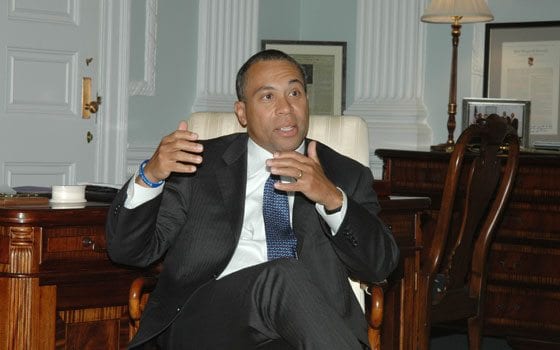
In a wide-ranging interview with the Banner, Gov. Deval Patrick discussed the importance of building for the future of the Commonwealth through a variety of policy instruments. Passing bond bills, readying infrastructure improvements and fortifying the state’s life sciences and renewable energy industries may not grab headlines, but Patrick sees them as critical to making Massachusetts competitive in the growing global marketplace and these hard economic times. (Tony Irving photo)
History has yet to be written on the gubernatorial skills of Deval Patrick.
But one thing is clear: Patrick is well on his way to changing the climate inside the State House. Change is what he promised, and change he is delivering.
He wears it well.
Oh, he made some rookie mistakes during his first 100 days, and one of his major economic proposals — casino gambling resorts — went down in flames.
But the key to evaluating Patrick is looking at the present and seeing not the past, but the future.
Who knew that Patrick, a civil rights attorney with an Ivy League-and-corporate pedigree, would enjoy the give-and-take of political infighting? Who knew the nitty-gritty of municipal finance would challenge Patrick to translate his grand ideas of change into line items with money attached?
Though there is little sexy about bond issues, Patrick appears to relish in filing them — everything from a $1.4 billion energy and environmental bond bill that would protect open space to a $2.9 billion transportation bill that would provide much needed capital to repair and maintain long-neglected public roads and bridges. By the way, Patrick also filed a $2 billion higher education bond bill that would make what he considers to be an “historic” commitment to the state’s public college and universities.
The transportation money is no trivial matter. The federal government ranked Massachusetts as the 35th state in percentage of interstate roads graded as “good” or “excellent.” The Commonwealth’s percentage of structurally deficient and functionally obsolete bridges is twice the national average and third highest in the nation.
But those sorts of mundane issues don’t really grab headlines. What did catch the media’s attention was Patrick’s unsuccessful attempt to bring casino gambling to the Commonwealth. Even that very public defeat didn’t trigger any resentment in the governor — for his opponents in general, or House Speaker Salvatore F. DiMasi in particular.
The question was one of leadership. And given recent media accounts of the tension between Patrick and DiMasi, Patrick looked almost better for the fight during a recent interview with the Banner.
“We differ on stuff, sometimes sharply,” Patrick said. “But we remain generally philosophically aligned, and I respect the good-faith efforts of the Speaker and the Legislature.”
Patrick wanted three casinos and estimated that their construction alone would generate 20,000 jobs. Of course, those numbers were disputed, but the real issue was whether the state should be in the business of big time gambling. It’s not.
“It wasn’t a matter of the opposition simply wanting one casino as opposed to three,” Patrick said. “It never got to the horse trading part. The opposition was philosophically opposed to the legislation.”
Even in defeat, Patrick saw a good-faith effort in trying to solve all that ails the state.
And that’s the point. At least Patrick is talking about more than raising taxes or slashing budgets.
“For the first time,” Patrick smiled, “we are talking about the Commonwealth as a revenue producer. We’re not ‘Taxachusetts’ anymore. We want to be very competitive.”
It couldn’t come at a better time. Given the state of the national economy and the ever-increasing cost of living for Massachusetts residents, Patrick faces one of the biggest hurdles in recent state history — the challenge of keeping people here.
To do so will require job growth and business development, closing up loopholes and retooling a workforce to handle the variety of jobs in emerging fields like life sciences and renewable energy.
It’s more than just talk with Patrick. Last month, the governor announced $276,466 in workforce training grants to five companies in the Merrimack Valley region. The grants were a small part of almost $18 million in grants to 200 companies across the state to train an estimated 16,000 workers.
Closing the unintended tax loopholes alone is expected to generate about $297 million in fiscal year 2009. As part of that measure, Patrick — popularly mischaracterized by conservatives as the quintessential tax-and-spend liberal — reduced the corporate tax rate from 13 percent to 8.3 percent over three years. Patrick estimates that in its first year of implementation, the tax cut for businesses would put about $200 million back in the hands of business owners.
And as Patrick points out, that legislation passed both houses of the Legislature without serious bickering. As did his legislation that could turn the Commonwealth into an alternative and renewable energy powerhouse.






